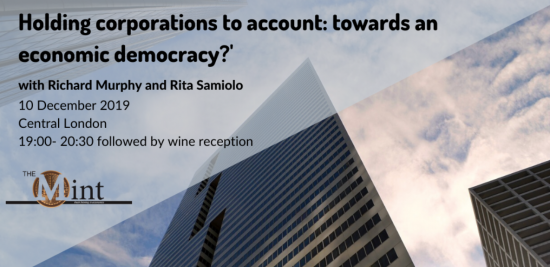Holding Corporations to Account: towards an Economic Democracy?Tuesday, December 10, 2019 from 7:00 PM - 8:30 PM ***** EARLY BIRD TICKETS WITH 1/3 DISCOUNT END 26TH NOVEMBER ***** We take it for granted that we get to vote in elections, but that is of course a relatively recent innovation. Universal suffrage only occurred in 1928. However most of us don't get a say in how corporations organise our economy. They produce accounts for their shareholders but largely ignore their other stakeholders such as employees, customers, suppliers and wider society, despite recent attempts to enhance corporate reporting. And only the shareholders get a vote, which few use. In the meantime, although governments do regulate corporations, their aim is largely to stop illegality rather than to create an economy that serves us all. But the fact is that the everyday operations of our largest companies affect us all in our everyday lives, as well as our future prospects. In a very real sense the future of our planet is in their hands, whilst in the shorter term if they go bankrupt, as Thomas Cook recently did, they can have huge immediate impacts on their employees, customers and suppliers. So should and could corporations be more accountable to their stakeholders beyond investors? And how might that work in practice? These are the questions that Richard Murphy and Rita Samiolo will set out to answer followed by open discussion and then a wine reception. Richard is a chartered accountant and a political economist, an anti-poverty campaigner and a tax expert. He is Professor of Practice in International Political Economy at City University, London and Director of Tax Research UK. He is the author of a number of books, including "The Joy of Tax". Rita is Lecturer in Accounting and Financial Management at King's College London. Rita's research is in the area of social and institutional studies of accounting. She is particularly interested in studying economic calculation from the perspective of the history and sociology of science, examining the epistemic assumptions underlying costing and performance measurement approaches. She has worked on empirical topics such as the appraisal of large public sector projects and the rise of rankings in transnational governance. At:
The School of Economic Science 11-13 Mandeville Place
London, England W1U 3AJ |
||
|
Thanks for reading this post.
You can share this post on social media of your choice by clicking these icons:
You can subscribe to this blog's daily email here.
And if you would like to support this blog you can, here:



